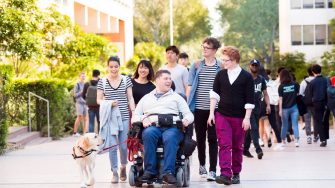
Research into special and inclusive education aims to understand and respond to the needs of students with a lived experience of disability. An associated research team at UNSW – the Special and Inclusive Education Research Group (SIERG) – seeks to engage with the wider community of schools, people with disability and service providers, with the goal of improving the outcomes of people with disability across at all stages of education.
SIERG membership is comprised of prominent researchers, higher degree research students, educators and people with lived experience of disability. Much of this research is accomplished through participatory and inclusive research, action research and community consultation.
Research team – who we are
-
We work towards ensuring the principles of inclusive and special education and research are promoted where all people – regardless of disability, difficulty or disadvantage – are afforded quality education through appropriate adjustments to learning activities and resources, throughout their lives.
This goal is reflected in the vision statement of our associated research group, SIERG:
“A nation should not be judged by how it treats its highest achieving citizens, but by how it values, embraces and supports all people, especially its most vulnerable ones.”
Some of the methods we use to achieve our aims include:
- Adding to the existing body of knowledge through the publication of academic journal articles, professional journal and magazine articles, books, conference papers, conference presentations, social media, and exposure in mainstream media
- Conducting research that contributes to increased social and educational inclusion of people with disability
- Conducting research that contributes to the knowledge base on special education interventions and supports across a wide range of educational environments
- Conducting – where appropriate – inclusive research, in which people with disability have the role of co-researchers (and not just participants)
- Using innovative methodologies to enable access to research for people with diverse disabilities (for example, arts-based methodology)
- Endorsing and supporting the use of the principles of Universal Design for Learning (UDL) in the teaching process in schools and all educational institutions
- Disseminating information about current research to members of our team, the UNSW community and the wider public
- Advocating for the use of evidence-based academic and behavioural practices to be used in all educational settings, particularly in K-12 education
- Providing professional learning opportunities for educators in disability, and special and inclusive education
- Engaging with educational institutions to support action research in schools
Through these methods, we strive to lessen the ‘research-to-practice’ gap and promote the concept that all people should have the opportunity to be educated to reach their full potential to become positive and confident individuals who are able to self-advocate and embrace lifelong education.
-
- Transitions in lives of people with disability
- Capturing the voices of students with moderate and high support needs about their education experiences
- Sex education for students with intellectual disability
- Impact of self-advocacy on wellbeing of people with intellectual disability
- The provision of wraparound services for students with complex support needs
- The implementation of Universal Design for Learning in schools and in tertiary education
- The implementation of Positive Behavioural Interventions and Supports (PBIS) in schools
- The use of technology to improve the learning and behavioural outcomes of students with disability.
-
- Professor Iva Strnadová
- Professor Terry Cumming
- Dr Joanne Danker
- Dr Ellen Lee
- Dr Sue O'Neill
- Michelle Tso
- Benjamine Garcia-Lee
- Caroline Basckin
- Saira Hossain
- Chen Han
- Dr Sarah Mulholland
- Michelle Davies
- Helen Bryce
- Kelly Muffet
- Nirosha Boden
- Julie Loblinzk
- Laurel Mimmo
- Helen Shearing
- Sarah Hayes
- Michelle Selvaraj
-
Matraville High School
Centennial Park High School
Self Advocacy Sydney
Arizona State University Department of Special Education
-
- EDST5111 Intellectual Disability
- EDST5113 Students on the Autism Spectrum
- EDST4080 Special Education
- EDST5133 Creating Engaging Learning Environments
- EDST5458 Researching Special Education
- EDST5106 Advanced Behaviour Support Strategies
- EDST5134 Addressing Special Needs
- EDST5118 Professional Practice for Special Education
- EDST5138 Inclusive Education
- EDST5129 Transitions in the Lives of People with Disability
- EDST4084 Managing the Classroom Environment
